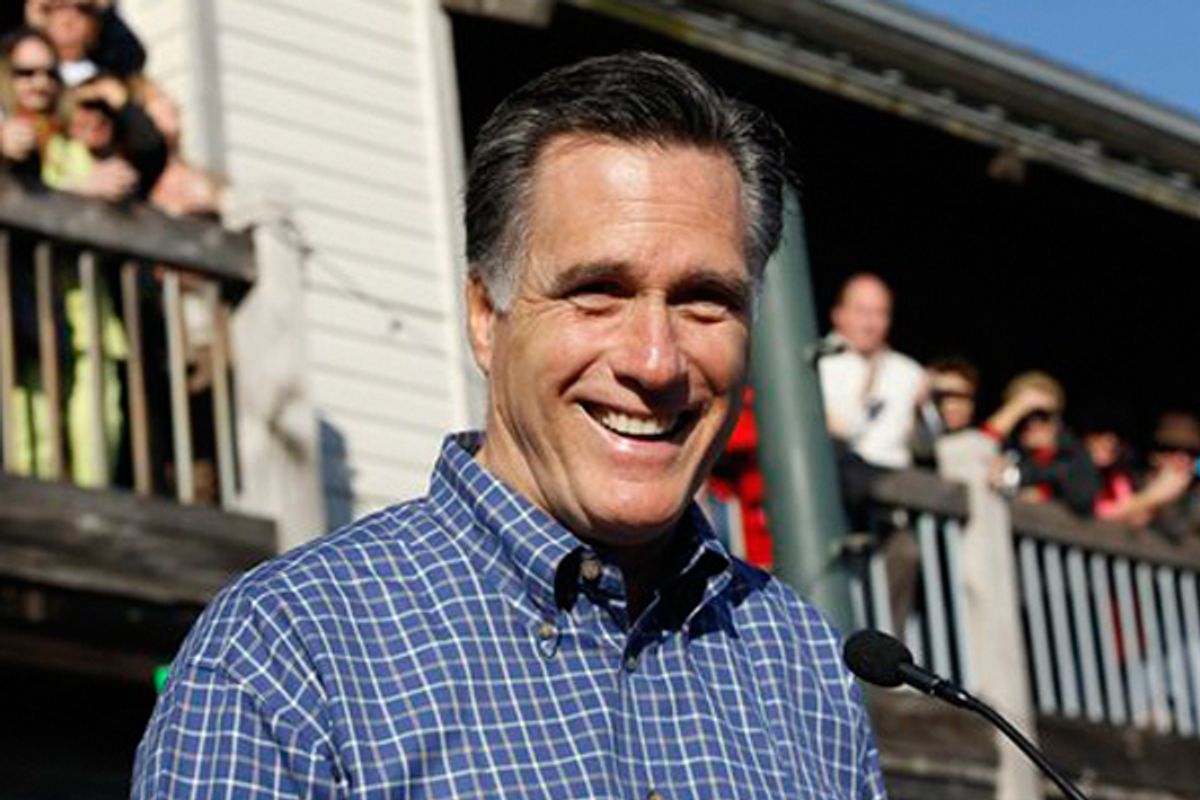Barring a Hillary-esque surprise, the month of January will close a few hours from now with some very good news for Mitt Romney -- a victory in the Florida primary, and with it a chance to kick off a February roll that could put some real, permanent distance between him and Newt Gingrich.
But this doesn't change the fact that the first month of 2012 has been a painful one for the GOP front-runner, who suffered a humiliating defeat in South Carolina (and was forced to move farther to the right, mainly on immigration, as a result) and who saw his personal wealth, tax status and unflattering aspects of his career in private equity all dominate the news.
All of this has taken a toll on his standing with general election voters. An ABC News-Washington Post poll released last week showed the former Massachusetts governor's favorable rating with all voters sliding to 31 percent, with 49 percent rating him unfavorably. The erosion was particularly pronounced among working-class white voters, a constituency that played a crucial role in the GOP's 2010 midterm landslide and that Republicans must appeal to if they are to unseat Barack Obama this fall. Among this bloc, Romney's unfavorable rating rose by 20 points, from 29 to 49 percent. The finding seemed consistent with exit poll results from the first three GOP contests, which showed Romney cleaning up among affluent Republican voters -- and struggling mightily with the working- and middle classes.
Now comes more troubling data from Romney, per another ABC/WaPo poll. By a 40-35 percent margin, general election voters said they have an unfavorable view of "Romney’s work buying and restructuring companies before he went into politics." Greg Sargent adds some more detail:
The Post polling team also tells me that among non-college whites — a key swing consistency that is one of the main targets of the battle over Romney’s corporate past and taxes — 35 percent view his Bain work favorably, versus 38 percent who view it unfavorably. Among moderates, the numbers are 32-39.
There's plenty of other evidence that confirms a very real and very serious January decline in Romney's standing with the swing voters who will decide the November election. The question, of course, is how permanent this damage is.
After all, it's not unheard of for presidential nominees to defy the seemingly lethal damage they suffered during their primary campaigns. The best example of this is probably Bill Clinton, who was battered by multiple scandals and embarrassments in the 1992 primaries and emerged with astronomically high negative ratings, particularly on the question of trustworthiness. Clinton, rival candidate Bob Kerrey suggested as the primaries wound down, would be opened up "like a soft peanut" by the Republicans in the fall. So severe were Clinton's primary season woes that he found himself running a very distant third (behind George H.W. Bush and Ross Perot) in general election trial heats by late spring.
But economic anxiety was rampant and the public was eager for an alternative to Bush, especially when the media began probing Perot's background and the billionaire Texan seemed to crack up. Voters gave Clinton another look, and he emerged from the Democratic convention with a lead that he didn't lose for the rest of the campaign.
For that matter, there's also the less dramatic example of Obama, who went through a dark period in April 2008, when Jeremiah Wright dominated headlines and Hillary Clinton scored a big win in Pennsylvania's primary. Polls conducted at the time suggested that Obama had been damaged by the primary process and might make a risky nominee. But those fears didn't last long.
So it's possible that Romney is simply experiencing the low point that practically every nominee goes through at some point in the primary process -- that the same swing voters who now seem to be souring on him will be as eager to give him a second look this summer as they were with Clinton in '92, and that Romney will then rise to the occasion.
On the other hand, it's also possible for the primary season damage inflicted on a candidate to be permanent. Just ask Jimmy Carter. The risk for Romney is that even as the specific events of the past few weeks fade in the public's memory, some real general election vulnerabilities have been exposed.
After Iowa and New Hampshire, some of his GOP rivals began attacking him as a "vulture capitalist," prompting the media to explore his business record, expose its least flattering aspects, and press him to release (for the first time in his political career) some of his tax returns. Mischievous Democrats were happy to pile on when they could. That in the face of this Romney's support fell so sharply among such specific demographic groups suggests a potential problem for the fall: His top 1 percent-ness seems to turn off some very important voting blocs. So there's some reason to suspect that Obama and his team will draw blood by bringing up Bain Capital and Romney's 14 percent effective tax rate over and over again in the fall.
This is not quite the same as what happened with Clinton, whose primary season troubles related to very specific, discrete episodes -- Gennifer Flowers, the Vietnam draft, "I didn't inhale." Relitigating these topics proved to be a dead end for Republicans in the fall, with voters deciding they were satisfied enough with Clinton's explanations and judging the subjects irrelevant to the most important issue on their minds, the economy. The economy will again be the top issue this fall, but the Romney vulnerabilities that have been exposed seem directly related to it.



Shares